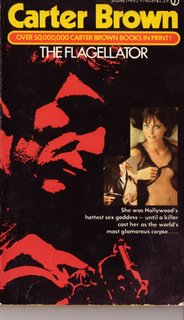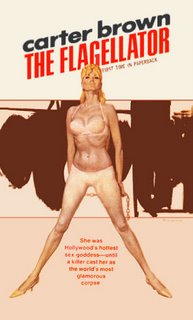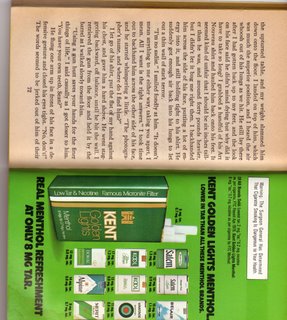
THE FLAGELLATOR, BY CARTER BROWN (1969)
The cover to my edition of Carter Brown's The Flagellator boasts that there are "over 50,000,000 Carter Brown Books in print!" That may be an exaggeration, but apparently it's not an outrageous exaggeration. Other Carter Brown books you might enjoy:
Catch Me A Phoenix
Donovan
The Deadly Kitten
Had I But Groaned
Nude With A View
Chinese Donovan
W.H.O.R.E.
and
So What Killed The Vampire
Oh, why stop there. There's also Night Wheeler,The Pipes Are Calling, The Dame, The Corpse, The Desire, and on, and on, and on.
Never heard of Carter Brown? Me neither. But apparently he sold a lot of books, many of which can now be acquired for $1.49 and less at Amazon. Who was Carter Brown? According to this site, Carter Brown was a pseudonym for Alan G. Yates, who also wrote as Tex Conrad and Caroline Farr. Yates was born in England and moved to Australia after the war but set all his tales in America, a place he knew best from movies and other writers. Based on The Flagellator, which appeared in 1969 between Die Anytime, After Tuesday! and Murder Is The Message, he passes for Yank pretty well, apart from his use of the word "cheaters" when he means sunglasses.
The novel concerns the adventures of one Rick Holman, a well-compensated Los Angeles private eye hired to look into the near-death of a faded Hollywood star on the verge of a comeback. The cast of characters includes a nymphomaniacal secretary, the stars highly sexed assistant, a lecherous producer with a teen-fixation, and a pair of sociopaths. The eponymous "flagellator," a hot-tempered director (named Altman, no less), is actually one of the novel's duller characters. ("He uses his tongue instead of a whip... After a while people working for him wish he'd use a whip--—it would be a hell of a lot less painful.")
The story is fairly inventive, even if the characters don't really behave much like humans. Brown has a workmanlike prose style that occasionally finds a clever turn of phrase or poetic passage. On the star's downward career slope:
"So he signed her up to a penny-ante contract and brought her to Hollywood as just another cute fresh-faced kid with no discernible talent. For the next couple of years, he kept her happy with small parts in two bit movies the gonowheree except the desert wastes of late-night television."
"I guess it reassures them to know they're still alive," I volunteered helpfully. "No one's ever dead as long as there's late-night movies on television."
Brown's also quite enthusiastic about sex. A woman doesn't enter or leave a room without Holman noting and commenting, sometimes aloud, on her breasts and buttocks. I can't decide if this is sensationalistic or just a too-honest depiction of the male psyche. The big sex scene is explicit and a little clumsy. (Does anyone find the words "boobs" and "vagina" sexy?) I'm also guessing it appears at pretty much the same point it appears in other Brown novels. Not that I'm burning to find out, although I wouldn't call The Flagellator an unpleasant read. I also think I got through its 140 pages in about 90 minutes, not because I couldn't put it down, but because there was no compelling reason not to keep reading.
One definite disappointment, I must have a later, '70s-era printing, hence the lousy cover. The original cover looked like this:

But at least I did get a version with a cigarette ad inserted at the halfway point, presumably because that's a fine point to take a break and enjoy a smoke.



No comments:
Post a Comment